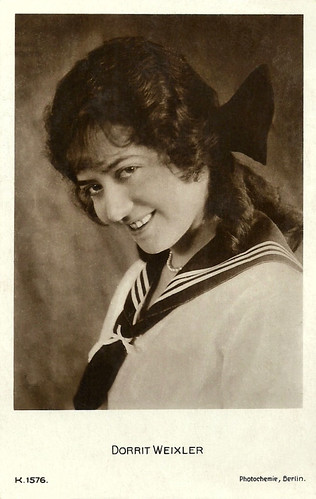
German postcard by Photochemie, Berlin, no. K. 1576.
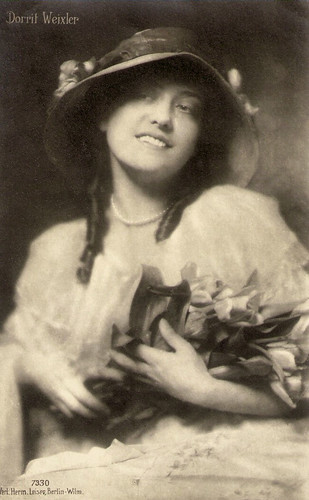
German Postcard by Verlag Hermann Leiser, Berlin-Wilm, no. 7330.

German collectors card by Ross Verlag in the series Vom Werden Deutscher Filmkunst - Der Stumme Film, no. 45, group 43. Photo: Tobias-Film. Bruno Kastner, Dorrit Weixler and Frida Richard in Dorittchens Vergnügungsreise/Little Dorrit's Pleasure Trip (Paul Heidemann, 1916).

German postcard in the Moderne Künstler series by MMB, no. 455. Photo: F.J. Wesselsky.
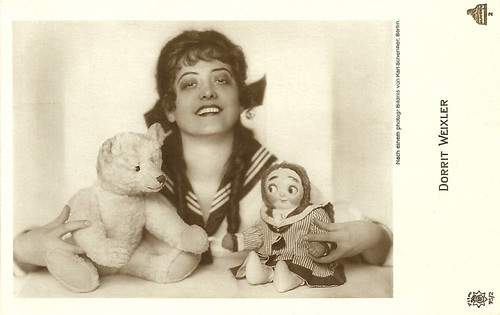
German postcard in the Film-Sterne series by Rotophot, no. 75/2. Photo: Karl Schenker, Berlin / Oliver-Film.
Quicksilver
Dorrit Weixler was born in 1892. The actress Grete Weixler was her younger sister.
She first appeared in short films in 1911, like Seine erste Liebe/His First Love (Alwin Neuss, 1911) and Alwin auf der Hochzeitsreise/Alwin's Honeymoon Trip (Alwin Neuss, 1911), both featuring Alwin Neuss.
In 1913 she began a successful collaboration with silent film director-screenwriter Franz Hofer at the Luna Film studio. She had her breakthrough with Das rosa Pantöffelchen/The Pink Slipper (Franz Hofer, 1913) with Franz Schwaiger.
Hofer and Weixler would make ten films together such as Das Liebesbarometer/The Barometer of Love (Franz Hofer, 1914). In Ein verliebter Racker/A Rascal in Love (Franz Hofer, 1915) and Fraülein Piccolo/Miss piccolo (Franz Hofer, 1915) her film partner was the future film director Ernst Lubitsch. In Fraülein Piccolo she played a quicksilver waitress dressed up as a boy to push away the clients.
Other popular roles were the temperamental teenager or the tomboy in a sailor suit who is tamed by the 'right man'. During the First World War, Hofer directed her also in such patriotic war dramas as Deutsche Helden/German heroes (Franz Hofer, 1914) and Weihnachtsglöckchen/Christmas Bells (Franz Hofer, 1914).

German postcard by Verlag Hermann Leiser, Berlin-Wilm., no. 1550. Photo: Willinger.

German postcard in the Film-Sterne series by Rotophot, no. 75/3. Photo: Karl Schenker, Berlin / Oliver-Film, 3.

German postcard in the Film-Sterne series by Rotophot, no. 76/1. Photo: Karl Schenker, Berlin / Oliver-Film.
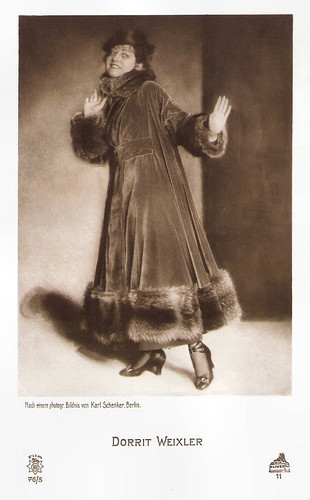
German postcard in the Film Sterne series by Rotophot, no. 76/5. Photo: Karl Schenker, Berlin.

German postcard in the Film Sterne series by Rotophot, no. 77/4. Photo: Karl Schenker, Berlin.
Stress
In 1915, Dorrit Weixler left Hofer and Luna Film to work for producer David Oliver at Oliver-Film, where she became the leading actress. Her type of roles stayed the same, and her directors Paul Otto and Paul Heidemann were often also her partners on screen.
The films were all about her and sometimes bore her name in the titles. Examples are Dorrits Chauffeur (Paul Otto, 1915) and Dorritts Vergnügungsreise/Dorritts pleasure trip (Paul Heidemann, 1916) opposite Bruno Kastner.
End of May 1916, she made her stage debut in the Theater am Nollendorfplatz in a 'Dorrit Weixler-week'. One night she collapsed on stage. Unfortunately the stress of turning out one film after another - over 20 films in two years - had been too much for Dorrit.
While trying to recover in a Berlin sanatorium, matters grew worse. She became dependent on morphine. In 1916, at the apex of her success, Dorrit Weixler committed suicide by hanging herself. She was only 24 years old.
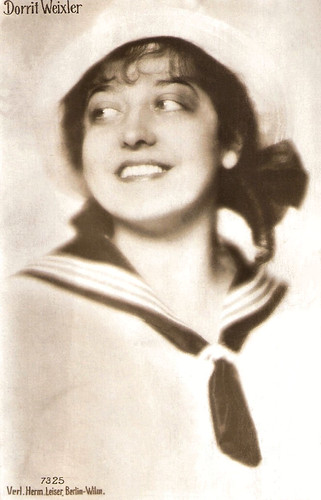
German postcard by Verlag Hermann Leiser, Berlin-Wilm., no. 7325.
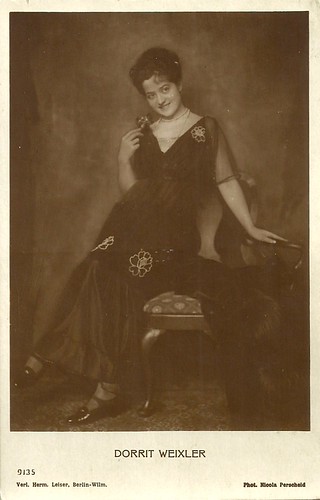
German postcard by Verlag Hermann Leiser, Berlin-Wilm., no. 9135. Photo: Nicola Perscheid.
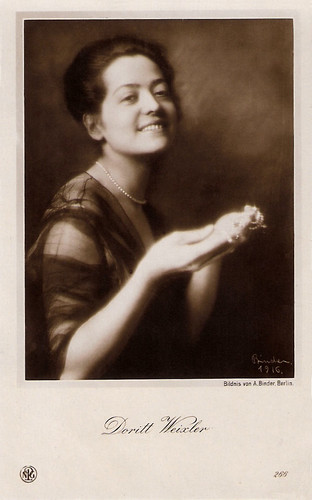
German postcard by NPG, no. 266. Photo: Alex Binder, 1916.

German postcard by Verlag Hans Dursthoff, Berlin, no. 996. Photo: Karl Schenker, Berlin / Oliver-Film.

German postcard by Verlag Hans Dursthoff, Berlin, no. 997. Photo: Karl Schenker, Berlin / Oliver Film.
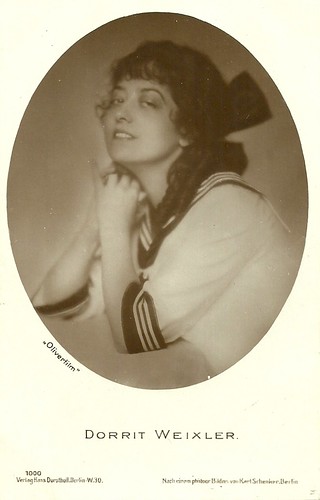
German postcard by Verlag Hans Dursthoff, Berlin, no. 1000. Photo: Karl Schenker, Berlin / Oliver Film.
Sources: André Stratmann (Stummfilmfan - German - no defunct), Thomas Staedeli (Cyranos), Wikipedia (German) and IMDb.
1 comment:
20 films in 2 years,,,amazing. What an interesting but tragic story. Thank you.
Post a Comment